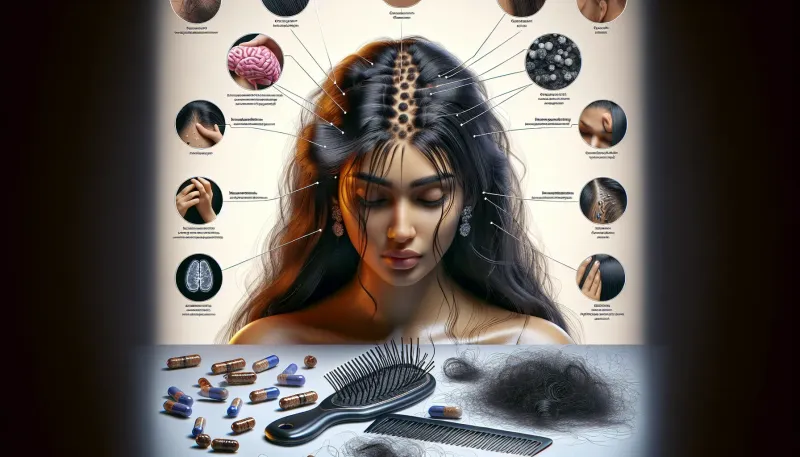Understanding Hair Loss After Pregnancy: Causes and Solutions

Explore the causes and solutions for hair loss after pregnancy. Learn how to manage and mitigate postpartum hair shedding effectively.
Experiencing hair loss after pregnancy is a common concern for many new mothers. This article delves into the underlying causes of postpartum hair loss, effective treatments, and practical solutions to help manage and mitigate the shedding process.
What is Postpartum Hair Loss?
Postpartum hair loss, also known as postpartum alopecia, is a condition where women experience significant hair shedding following childbirth. Although alarming, this hair loss is typically temporary and resolves on its own.
Causes of Hair Loss After Pregnancy
Hormonal Changes
The primary cause of hair loss after pregnancy is hormonal fluctuations. During pregnancy, elevated hormone levels, particularly estrogen, keep hair in a prolonged growth phase, resulting in thicker and fuller hair. However, after childbirth, hormone levels drop sharply, causing a large number of hairs to enter the shedding phase simultaneously.
Stress and Physical Changes
Childbirth and the postpartum period are physically demanding and may induce stress. This physiological stress can contribute to hair loss. Additionally, the body's recovery from labor and any related medical interventions or sleep deprivation can exacerbate hair shedding.
Nutritional Deficiencies
During pregnancy and breastfeeding, the body requires more nutrients. Nutritional deficiencies, especially in iron, zinc, and vitamins, can lead to increased hair loss. Ensuring adequate nutrient intake is crucial for mitigating hair shedding.
Symptoms of Postpartum Hair Loss
Postpartum hair loss usually begins around two to four months after delivery and can last up to six months or more. The symptoms include:
- Excessive hair shedding
- Noticeable thinning, especially around the hairline and temples
- Volume loss throughout the scalp
Effective Solutions for Managing Hair Loss After Pregnancy
Adopt a Healthy Diet
A balanced diet rich in vitamins and minerals can support hair health. Focus on foods high in iron, zinc, biotin, and vitamins A, C, D, and E. Incorporate proteins, leafy greens, nuts, seeds, and fruits into your meals to ensure you receive the necessary nutrients.
Gentle Hair Care
Opt for gentle hair care practices to minimize hair breakage and shedding. Use a mild shampoo and conditioner, avoid excessive heat styling, and refrain from tight hairstyles that may pull on the hair. Regularly trim split ends to maintain healthy hair.
Stress Management
Stress reduction techniques such as meditation, yoga, and sufficient sleep can positively impact hair health. Engaging in relaxing activities and seeking support from family and friends can alleviate stress, benefiting overall well-being and reducing hair loss.
Topical Treatments and Supplements
Topical treatments containing ingredients like minoxidil can promote hair growth. Additionally, taking supplements formulated for postpartum women can help address any nutritional gaps. Always consult with a healthcare provider before starting any new treatment or supplement.
Consult a Healthcare Professional
If hair loss persists or is accompanied by other symptoms such as fatigue, consult a healthcare professional. They can assess for underlying conditions like thyroid disorders or anemia and provide appropriate treatment.
Natural Remedies for Postpartum Hair Loss
Scalp Massages
Regular scalp massages can stimulate blood circulation and promote hair growth. Use natural oils like coconut or almond oil for added nourishment.
Herbal Treatments
Herbs like rosemary and aloe vera have been traditionally used to support hair health. These herbs can be used in the form of rinses, oils, or masks to strengthen hair and reduce shedding.
Conclusion
Hair loss after pregnancy, though distressing, is usually a temporary condition resolved with time and appropriate care. Understanding the causes and implementing effective solutions can help manage this condition, ensuring that hair regains its normal growth pattern. Maintaining a healthy lifestyle and consulting with healthcare professionals when necessary are key steps in overcoming postpartum hair loss.
Your journey through motherhood is unique, and experiencing changes like hair loss is a natural part of this process. Stay informed and take proactive steps to ensure your well-being and regain your confidence.



























